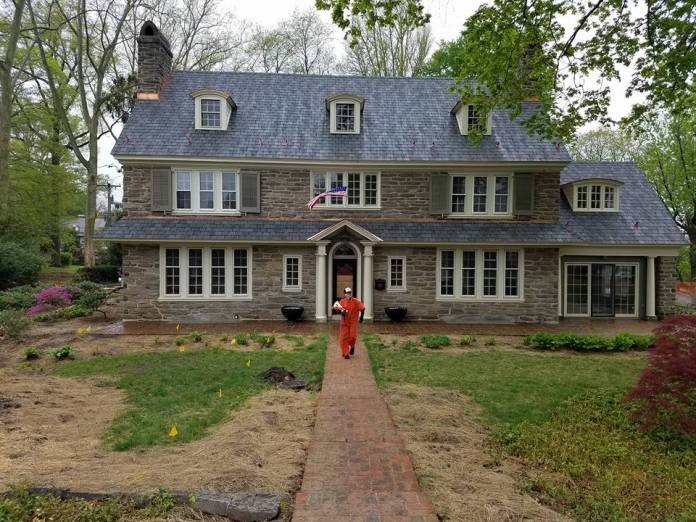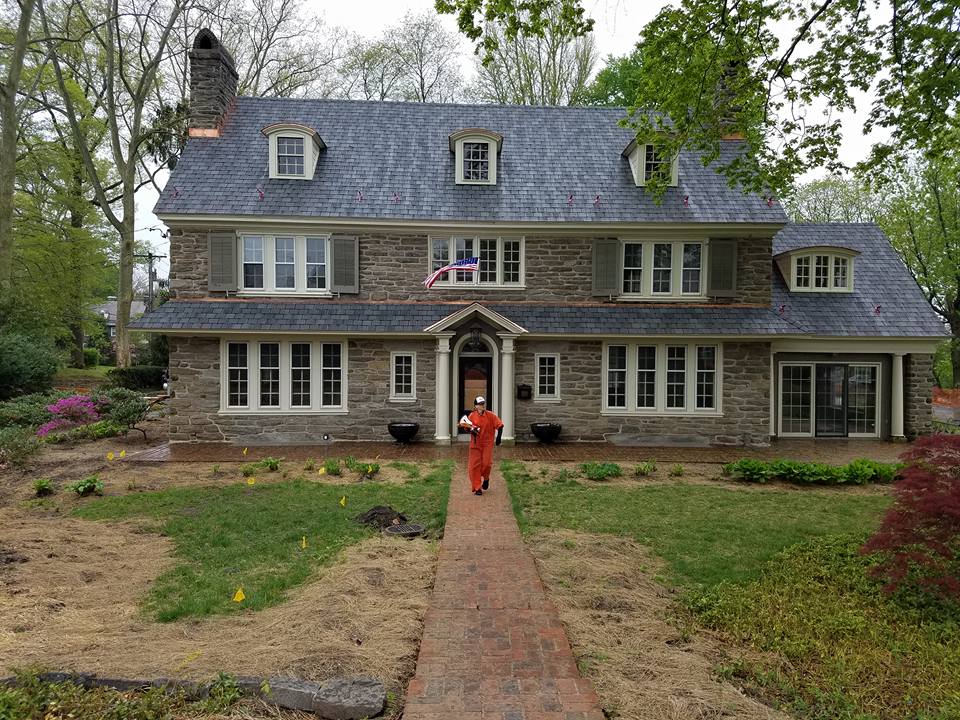
“Mr. Allison, Mr. Allison, this is your case-mangler, we are here for your daily, weekly, hourly room inspection.”
Covered in face mask, latex gloves and waving a mock pesticide spray bottle, I, playing a character I created called The Case-Mangler in POOR Magazine’s 2017 production of Theatre of the POOR, yelled through the “door” on the stage at poverty, disability, elder Skola Bruce Allison.

This play, like all of the Theatre of the POOR productions at PeopleSkool, is based on our real lives, our real experience, our real trauma. This is what happened to Bruce when after years of homelessness and languishing on endless groups of waitlists he got a tiny room in a single room occupancy Hotel (SRO) in the Tenderloin. And although it was billed as “housing” it was really a kinder, gentler, poor-people jail — with ID checks, no guests after a certain time, and an endless list of rules to contain the rowdy poor “residents.” But above all, one of the worst “rules” was and continues to be the constant and unbridled room and apartment inspections of his not-at-all-private space.
Privacy is a privilege
For any of us houseless and formerly houseless folks who have lived in any public or privately funded poor-people housing (or have received any other kind of aid for that matter) we have been subjected to incessant inspections of our yards, our rooms, our cars, our bodies, and our children. In the SROs or project-based Section 8 units, these inspections are constant and focused mainly on the “disease” as it is called, of “hoarding.”
Hoarding actually has a number attached to it and is listed in the encyclopedia of the empire — The DSM (Diagnostic and Statistical Manual) — which has created an official diagnosis for this “disorder” and like all of the disorders listed in the DSM is now used to criminalize, fund, organize, and stereotype poor people who supposedly “suffer” from it. The mere act of poor people having access to privacy is seen as a privilege we are not deserving of.
The odd part of all of this, is there are literally millions of people all over the world struggling with the confusion, violence, isolation, poverty, structural racism and classism, greed, and resulting trauma of a global post-colonial reality, and even more specifically the disease of Western hetero-patriarchal Capitalism. In other words, there are a lot of people with this “disease” but most of them don’t get called sick. It is a class and race based “illness” and the ones who get “diagnosed” with it are us poor folks.
The Rich are called Collectors
Rich people are called archivists, collectors, stock-pilers, museum curators, buyers, and owners. Having two or three or nine homes, condominiums, vacation getaways, more pictures than you can fit on your wall, in your home or in your office, four, five or 15 luxury vehicles, planes or boats, designer shoes you never wear, clothes you never try on, equipment you never use and literally billions of dollars they could never possibly need to survive. They are rarely, if ever, called out for their capitalist sickness of hoarding, never forced out of their housing, threatened, inspected, or harassed, but rather they get complemented on their ability to archive or collect or buy more and more things, and dollars, and stolen land. They are held up as examples of capitalist success.
On the converse if you are poor, you do not have the privilege or the “right” to have “too” many things — or actually pretty much anything. No matter how important our things even are. Once our lives are deemed dependent on the state, we have no right to the precious. How dare we collect mementoes, art, archives, papers, or anything deemed not absolutely necessary by a litany of people now “responsible” for our lives, housing and survival.
Help us save local journalism!
Every tax-deductible donation helps us grow to cover the issues that mean the most to our community. Become a 48 Hills Hero and support the only daily progressive news source in the Bay Area.
Now it’s true that sanitation and cleanliness is an important part of health and safety and it’s also true that many of us poverty skolaz who are “saved” by the system from our lives of homelessness suffer from extreme depression and struggle with serious trauma, psychological disabilities and the long-term effects of post-traumatic slave syndrome, capitalism, and colonization. We sometimes keep or get things to replace all the people, family, loved ones and/or children we have lost or who have been stolen from us. Normal things like mementos, family photos, cards, or old toys were long ago lost to the multiple evictions, displacements, foreclosures and/or incarcerations people like me and my mama suffered with throughout my childhood.
So we might begin to collect picture frames or batteries or like my tortured, traumatized mama, literally hundreds of pairs of socks and pill bottles. Due to our trauma we lack organizational skills, so we just make piles of things on top of more piles of things. Part of that is happening to a lot of us at POOR Magazine like Bruce and his beautiful partner Kathy, in their affordable housing units in GentriFUKation City. Both are disabled elders, with trauma of homelessness and ableism and endless harassing inspections.
The insane, hypocritical cycle of this process is that the few of us who get off the street into housing often end up facing homelessness again due to the poison cocktail of DSM fueled patholigizing and criminalizing of our behavior and actions and living spaces and the battery of anti-poor people laws that support the criminalizing.
Hoarding When you have no roof at all…
The collections, belongings, products of poor workers/recyclers, unhoused folks who haven’t been lucky enough to get access to a roof (or who are back outside again) don’t even get the “privilege” of an inspection. Rather, our belongings and our bodies are constantly and immediately viewed as trash, blight, a mess, dirty, unsanitary, dangerous, and unsightly and whisked away daily, weekly, monthly, hourly by a society and a system that refuses to allow poor people to even be seen, much less be human. Hence the constant “sweeps” and the use of the word “sweep” to describe the removal of unhoused peoples from so-called public streets. These violent acts of race and class based removal happens every day in San Francisco, Oakland and everywhere where this lie of public and private space and use of this already occupied indigenous land rules.
Touring the Real Blighted Hoods
This is why POOR Magazine and the Sogorea Te Land Trust launched the Stolen Land/Hoarded Resources Tours through the other kind of “blight,” the other hoarders. We are challenging and sharing the medicine of redistribution and something I developed called Community Reparations with people never seen as suffering from a disease. We are lifting up and sharing a different way of being with people whose actions are never questioned, whose choices to keep hoarding, exploiting, acquiring, and owning are not only unquestioned and un-pathologized but complemented, enabled and encouraged.
We travel from gated communities in Pacific Heights to the Shinnecock Nation in Eastern Turtle Island (The Hamptons), where the extreme wealth-hoarders acquire acres and acres of stolen indigenous territory only to put luxury houses on it. No food is grown, no peoples are housed, no ancestors are honored. This is the blight of poverty and scarcity and capitalism. And the shared belief that this is okay, that this is normal, that this is success is actually frightening to me.
For us unhoused and formerly unhoused poverty, disability, migrant and indigenous skolaz at POOR Magazine, barely surviving the loss and trauma of so much, we hold each other in ongoing healing as we try to build a poor people-led movement to land liberation and housing. In this process, one of the most important parts of this movement work is the creation of the Peoples Agreement which each member of the Homefulness/POOR Magazine Family had to write and co-create over a three-year period, a document which remains a living document, moving and shaping and changing each time we see another manifestation of our collective trauma.
One of our many innovative ways we try to build in the healing is through the creation of a trauma — support therapy healing group to process the collection of belongings and its relation to our collective living and build. As well as we will eventually launch a redistribution store for all the things we don’t need that we might acquire.
As the daughter, granddaughter and descendent of so many broken poor, indigenous and colonized women who have collected little tiny broken things to fill the places of so much broken and stolen from them, I do this work and teach this medicine to heal through a new, non-punitive framework. I don’t blame the wealth-hoarding 1 percenters any more than I blame myself or my family of unhoused poverty skolaz for accumulating, collecting, desiring of collecting or desperate with the stuckness of it all.
Please see this as a call out to the hard-working advocates to consider inviting me and other poverty skolaz from PeopleSkool in to your organizations and centers to teach advocates different models to hold the trauma of poverty in re-housing unhoused folks and finally an invitation to as many people as want to walk, co-lead or join us in the next Stolen Land/Hoarded Tour through Miwok Territory ( Marin County) as we share out this medicine with the people who no-one ever views as “sick.”
We all suffer from this disease called capitalism. Let’s all heal together.
To join, co-lead, or walk with us in the next Stolen Land tour thru Marin County email us at poormag@gmail.com. To find out more about the next peopleskool for folks with race and class privilege which will be held in Black August 2017 email us at deeandtiny@gmail.com

We suffer from serious trauma, psychological disabilities and the long-term effects of post-traumatic slave syndrome, capitalism, colonization and male gender dom."
You go Tiny! You go, girl!